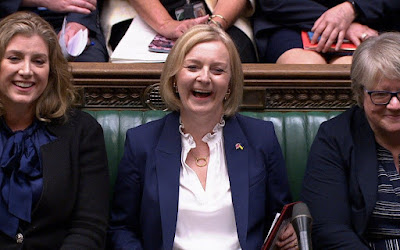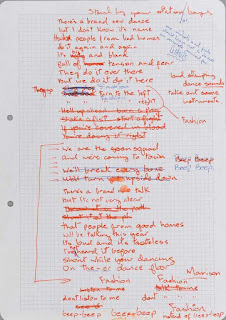Last week, in downloading an episode of the comedy and advice podcast “My Brother, My Brother and Me” already on my phone, I realised I had caught up with myself: in the fifteen months since discovering the show, I had now heard all six hundred and twenty-eight episodes released since its debut in April 2010. The first I heard of the three McElroy brothers, and “MBMBAM” was the notorious moment, in “Kickeo”, episode 514, when “your babiest brother” Griffin said he was known as “Porky Pig” at high school, because of the noise made by his “technique”: “ba-de-ba-de-ba-de-ba-de...” For forty-five solid seconds, Griffin, “your oldest brother” Justin and “your middlest brother” Travis were convulsed by the kind of laughter that only comes from a moment of “where the hell did that come from?”, before Travis laments that people confuse their voices, because they will think he said it.
As someone for whom the sound of people laughing may be their version ASMR, this was a brilliant moment, but also one that, like a large amount of their “bits” from the show, have been animated and placed on YouTube by creative people, and devoted fans, inspired by the McElroys and the imagery their “playing in the space” has created.
I felt like I had seen about a hundred different versions of the brothers before hearing my first full episode, which was number 562, titled “It Helps to Have a Cube”. With my only regular podcast being “CheapShow”, which I once described here as “the celebratory mix of trash culture and body horror that pushes taste for the perfect laugh” [link], I had caught “MBMBAM” on an appropriate week: Griffin began the episode as a cassette tape that had to be wound up, and who can also sharpen pencils with his behind; the brothers discuss how competitive hot dog eater Joey Chestnut deals with the inevitable trip to the bathroom; they answer a plea from a listener who wants to stop being the office jokester, before sharing how to hide from a murderer; they review the latest album by pizza play place mascot Chuck E. Cheese, and conclude that you should pour a ring of salt around a ghost to keep them in place.
With its surreal and absurdist humour not overlapping the scatological, almost Dadaist force of “CheapShow”, its shared grounding with “MBMBAM” as magazine-like formats in the safe space of “wholesome filth” made me feel like I was in the right place, so I kept listening, but went backwards for a bit, from the 500-range episodes, into the 400s, then 300s, but in January 2022, as I wrote about One Times Square [link], I heard the first four episodes from 2010, and progressed from there – having jumped around previously, the last episode I hadn’t heard was number 291, “Most Likely to Boat”.
Having now heard every episode so far, including the latest episode number 629, “Millennial Seinfeld” – a welcome moment for every time I heard a listener’s predicament and thought “what kind of ‘Seinfeld’ plot is this?” – what have I learned from “My Brother, My Brother and Me?
Malcolm Gladwell’s book “Outliers” is where the often-cited ten-thousand-hour rule for becoming an expert in a given field comes from. Once you realise there aren’t that many hours in a year, you appreciate the slow grind of putting in the work to get gradually better over time. While the McElroy brothers discourage listening to the first hundred episodes of “MBMBAM”, it is there where you hear the graft, the refinement, the encouragement and guidance from the show’s audience, the endearing talk of listening parties, online forums, and burning episodes to a CD for a friend, and later the liberating challenge of creatively advertising Extreme Restraints, a literal online sex shop. Hearing the show’s form and tone take shape, its hosts both in charge and along for the ride, was a liberating experience – you too can have a creative career, but you must put in the work.
Despite Bob Ball’s opening advisory that “the McElroy brothers are not experts, and their advice should never be followed”, it is only an advisory. After thousands of questions, they have arrived at major lessons like “act strong”, “keep your grades up”, and “will a sign help?”, but it can also be concluded that horses are essentially sacred, that a religion can be formed from eating a mango, “the man who sleeps with a machete is a fool every night but one”, and “if you nut in space, it push you backward”.
But with three people playing off each other like a TV writers’ room, entire passages have been created that put me in the mind of a sketch show rather than an advice column, like “The Ravioli Monster”, Traci Chapman’s “Faster Car”, Travis creating a “mango cult”, an entire episode taking apart the Robert DeNiro-starring comedy “The War with Grandpa”, and nearly “Clockwork Oranging” themselves over “hating” the celebrity-led podcast “Smartless” for winning an award for which they were also nominated (for their advertisement reads). A particular favourite is from episode 539, “Quantum Beef”, where a discussion on barbecues turns to the children’s TV science host Mr Wizard using dry ice to shatter a hot dog, before shouting,
“we’re all just meat! I’m basically 225 hot dogs strapped together with casing. Old casing, that saw some shit in ‘Nam! If you wanna look at the eclipse... you just burn a little bit of your eye meat, what do I care? It’ll grow back, or it won’t, then we all die. It’s meat. Life is a great experiment... You’re my son now? Your mom said I could adopt you. I promised to teach you science... I revealed to your mom the arcane meat secret, and she said she gave up. Now you’re my meat. I love you.”
I doubt anyone would have come up with the above passage by themselves, and the escalation, the lore, and the unexpected tenderness at the end marks out the three people that created it, and where their creative journey has taken them.
While I start looking into the role-playing game podcast “The Adventure Zone” that the McElroys began in 2014 with their radio presenter father Clint, my choices for five “My Brother, My Brother and Me” episodes, in no particular episodes, are:
#562 “It Helps to Have a Cube”: a listener’s first episode is forever cherished by them.
#468 “Down the Soda Hole”: presented with the force of “standing energy”, it is Justin’s asking “have you seen the movie Big Daddy?”, and Travis’s weary answer of “yes”, catches them all off guard.
#265 “The Ballad of Tit Liquid”: two words inspire a character that derails the rest of the show.
#482 “Face 2 Face: Big Stitch Energy”: a live show begun with a recap of the show’s history to date (October 2019), to the tune of Billy Joel’s “We Didn’t Start the Fire”, by superfan Lin-Manuel Miranda, who wrote the McElroys’ use of “unless, unless, unless”, to change tack on their advice, into the musical “Hamilton”.
Special “The My Brother, My Brother and Me Guided Sleep Experience for Spiritual Harmony”: sponsored by Casper mattresses, ASMR becomes deliberately quiet and unintentionally tense, followed by a Cockney countdown from 100 to zero.












